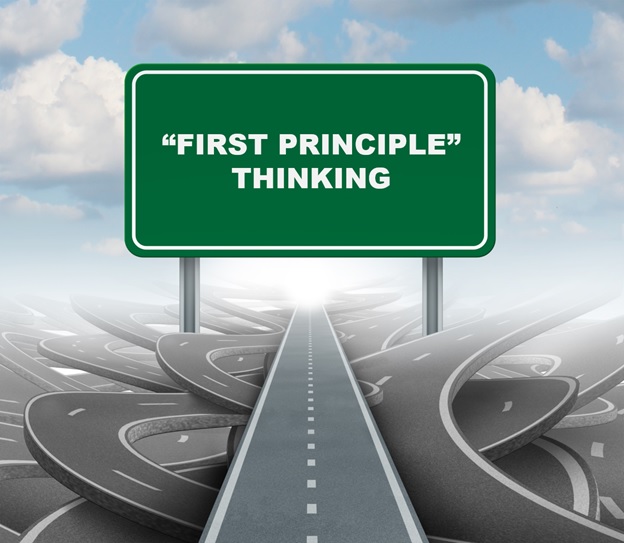
The Sunday New York Times Business section has a great feature called “Corner Office.” Each week they speak to a CEO who could be representing any company in the world. More often than not, there are nuggets of wisdom inside each of these business profiles.
This past weekend was no exception. The exec in the spotlight is Abe Ankumah, a Ghana-born businessman who runs a softwareanalytics company called Nyansa. He talked about the value of “first principle” thinking, and he described it this way:
“When you’re trying to solve a problem, you start by trying to understand the essence of the problem, rather than starting with what the answer should be and then working your way to justifying it.”
It’s always interesting when you read a marketing article or book and you come to find that something you did intuitively – because it seemed like the right idea at the time – fits into a larger strategic framework.
When we started jacapps, our mobile apps development company, it turns out we were using “first principle” thinking. The idea was to use the new technology provided by the iPhone and Apple App Store to create an effecitve way for radio stations to regain their portability following the demise of the Walkman.
We didn’t think about it in the sense that smartphones were becoming hot commodities, and that app development could turn out to be a highly profitable venture. It was about solving a problem. Those first generation apps essentially just did one thing – they provided a reliable audio stream on iPhones so broadcast radio stations could accompany listeners wherever they went. All the other bells and whistles on our apps came later.
Ankumah notes “first principle” thinking is especially applicable to start-ups and new ventures. And that’s precisely how we saw it during those days in late 2008 when we launched jacapps.
But “first principle” thinking applies to legacy businesses like radio stations, too. When broadcasters are looking for the so-called “hole in the market,” it’s very much like launching a start-up. And yet in radio, it’s easy to fall into the mindset of executing a format, rather than solving a problem and filling a need by truly serving an audience and a community in a unique and meaningful way.
It’s worth nothing that stations that start out by executing a “safe list” format ultimately have to address these larger issues and challenges revolving around personalities and serving communities. There are no shortcuts, but starting with “first principle” thinking – or “What problem are we trying to solve with this new format start-up? – can help members of the team get on the same page.

In Ankumah’s mind, it’s essential to have people on staff who are invested in solving the problem rather than going through the motions and simply doing their jobs.
He advises the right people can be identified in job interview situations by having them talk about problems they’ve tackled and their passion level when they discuss the solutions. Ankumah also talks about adaptability – a quality that is essential in start-ups – and in radio – because curve balls are plentiful.
We learned that in spades with jacapps. The fluidity of the mobile space was something we simply couldn’t have imagined during the launch period. As the years rolled on, we were there for the birth of the Android platform, and later, in-car media systems like Apple CarPlay and Android Auto. These innovation shifts are all part of the zigs and zags successful mobile app companies have to negotiate in order to survive and thrive. But it starts out with an adherence to “first principal” thinking, keeping your focus on the problem your company is trying to solve.
And so it is with radio formats, too. Few businesses witness the kinds of overnight format attacks, personality defections or emergencies, and other unknown variables that can threaten a station’s market share, stability, and profitability. Great programmers and their teams have to nimbly adapt to these sudden and seismic shifts, keeping their collective eye on their larger mission.
“First principle” thinking is a strategic foundation that can benefit brands in any industry.
How can you apply it to your job, your career, and your company? What problem are you trying to solve?
Something to think about over the holidays.
- What Is It With Female Robot DJs? - April 30, 2025
- Why “Dance With Those Who Brung You” Should Be Radio’s Operating Philosophy In 2025 - April 29, 2025
- The Exponential Value of Nurturing Radio Superfans - April 28, 2025




Leave a Reply